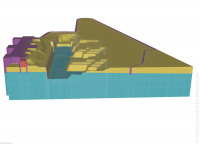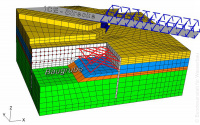Numerical Methods: Difference between revisions
From BAWiki
Created page with "== Groundwater models == 200px|thumb|right|Picture 1: Groundwater model for the excavation pit for Minden lockBasis for the calculation of gro..." |
The LinkTitles extension automatically added links to existing pages (<a target="_blank" rel="nofollow noreferrer noopener" class="external free" href="https://github.com/bovender/LinkTitles">https://github.com/bovender/LinkTitles</a>). |
||
| Line 6: | Line 6: | ||
== Interaction of ground and building structure == | == Interaction of ground and building structure == | ||
[[File:06_Numerische_V_02.jpg|200px|thumb|right|Picture 2: 3D model of the excavation pit for Sülfeld lock]]Deformation and stability calculations for building structures used in waterways engineering are increasingly carried out using the finite element method (FEM) and in recent years also the distinct element method (DEM). The advantage of FEM is that it can be used to visualize complex geometries and ground conditions, and also indicates interaction between building structure and the ground. | [[File:06_Numerische_V_02.jpg|200px|thumb|right|Picture 2: 3D model of the excavation pit for Sülfeld lock]]Deformation and stability calculations for [[building]] structures used in waterways engineering are increasingly carried out using the finite element method (FEM) and in recent years also the distinct element method (DEM). The advantage of FEM is that it can be used to visualize complex geometries and ground conditions, and also indicates interaction between [[building]] structure and the ground. | ||
[[Interaction of ground and building structure]] | [[Interaction of ground and building structure]] | ||
---- | ---- | ||
Latest revision as of 10:21, 21 October 2022
Groundwater models

Basis for the calculation of groundwater flow is its description using mathematical models. Numerical computational methods based on the finite element method (FEM) or the finite difference method (FDM) meanwhile offer a suitable range of standard instruments for dealing with complex geohydraulic issues.
Interaction of ground and building structure

Deformation and stability calculations for building structures used in waterways engineering are increasingly carried out using the finite element method (FEM) and in recent years also the distinct element method (DEM). The advantage of FEM is that it can be used to visualize complex geometries and ground conditions, and also indicates interaction between building structure and the ground.
Interaction of ground and building structure
back to: Geotechnical Engineering Methods
